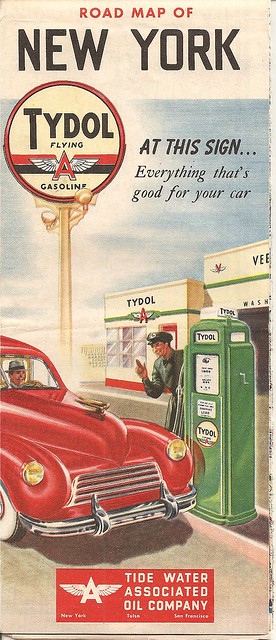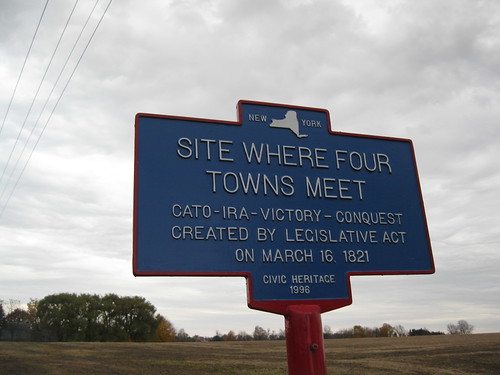Blue Highways: Salem, New Jersey
Unfolding the Map
 What is in a place name, especially those that evoke other places? I am of the opinion that place names often help us keep alive those other places that we came from or identify with. As William Least Heat-Moon (LHM) swings through Salem, New Jersey we'll see how this little town inspired the names of possibly three other Salems in the United States. To see the source of this inspiration, please be inspired to visit the map. The red oak leaf, at right, comes from New Jersey's official state tree.
What is in a place name, especially those that evoke other places? I am of the opinion that place names often help us keep alive those other places that we came from or identify with. As William Least Heat-Moon (LHM) swings through Salem, New Jersey we'll see how this little town inspired the names of possibly three other Salems in the United States. To see the source of this inspiration, please be inspired to visit the map. The red oak leaf, at right, comes from New Jersey's official state tree.
Book Quote
"Salem, a colonial town to the west, was abundant with old buildings and homes that would be museums most anywhere else in the country, but here they were just more declining houses, even though many stood when the men of Salem sent beef to Valley Forge to help save Washington's troops from starvation. The town is the birthplace of Zadock Street, a restless fellow who left New Jersey in 1803 to make his way into the new western territory. As he went, he and his sons founded towns in Ohio, Indiana, and Iowa, and named them all Salem; in Ohio, his Salem sprouted North Salem, West Salem, South Salem, Lower Salem, and Salem Center. Americans can be thankful that Zadock Street was not born in Freidberger or Quonochontaug."
Blue Highways: Part 9, Chapter 12
 Downtown Salem, New Jersey. Photo by Tim Kiser, and hosted at Wikimedia Commons. Click on photo to go to host page.
Downtown Salem, New Jersey. Photo by Tim Kiser, and hosted at Wikimedia Commons. Click on photo to go to host page.
Salem, New Jersey
I've had a couple of posts about town and city names, and LHM has succeeded in piquing my interest in a little mystery. Why would a man named Zadock Street, of Salem, New Jersey spread out west with his sons and name all the towns they founded Salem? What is it about the name Salem that was so important to these men?
First things first. How many towns and cities and places are named Salem. One source, Wikipedia, lists 25. Another source, on Yahoo, lists 32. Clearly people had reasons for naming towns Salem. From what I've gathered online, Salem is a derivation of shalom and salaam, the Hebrew and Arabic words for peace. Salem was mentioned as a place in the Old Testament, and became part of the name of Jerusalem, founded by King David of the kingdom of Israel. Jerusalem means "foundation of peace."
Therefore, we can see that the most likely spread of the name Salem came with the spread of religion throughout the country. Indeed, one source who uses the same quote by LHM above, looks into the story of the towns named Salem and of Zadock Street and wonders if LHM's story is true. The writer points out that Zadock was one of King David's priests, thus cementing the connection between Zadock Street and religion. The writer looks at the founding of Salems in Ohio, Indiana and Iowa that LHM says were established by Zadock Street and his sons and finds the evidence less than compelling. Those Salems were founded by Quakers, the writer claims. The writer says that there is no evidence that Zadock Street had anything to do with their founding, and there is no compelling evidence that Zadock Street or his sons were Quakers.
Thankfully, the internet can sometimes help clear up mysteries. Wikipedia's entry states that one of the founders of Salem, Ohio was Zadock Street and an historic home in the city was owned by John Street, Zadock's son, and was the northernmost Ohio stop on the Underground Railroad. The city of Salem in Indiana appears to have nothing to do with Zadock Street, but there are two other areas called Salem in the state, both census-designated places, that may have had something to do with Zadock Street. And while I could not associate Salem, Iowa with Zadock Street or his sons, the town was founded by Quakers and was also a stop on the Underground Railroad.
What accounts for so many towns named Salem, then? In the case of the Zadock Street and his sons, it may have been that religion plays a part in their propagation of the Salem name, but I think that there is a greater likelihood that the connection to their original home of Salem, New Jersey played a bigger part. In a sense, we all have that attachment to home. I cannot see the name Fort Bragg, even if the name is attached to Fort Bragg, North Carolina rather than my hometown of Fort Bragg, California, without getting pictures and images in my mind of all of the scenes I used to inhabit as a child. The United States, as a country that was settled primarily by immigrants, would have been an alien place. Names that evoked the familiar would have been important to people, comforting them with memories of places known in the midst of all the unknowns.
I did a post awhile back where I examined why there were so many towns, throughout the Southwest, called a variant of El Dorado. In that case, Spanish conquistadors looking for gold, the proverbial El Dorado, left that name all over the region. That was a case of wishful thinking. However, in many cases it seems that people named towns and cities after that which gave them comfort and something that evoked memories of the places from whence they came. I surmise that if you closely into town names, they've either been named for someone, or after something left behind.
Place names are a very simple part of a complex process. No matter how adventurous or how exploratory we are, or how much we push the boundaries of our experience, we seem to need that touchstone to what we were and where we've been. Two of the most poignant examples of this comes from our explorations into space. The first example occurred when astronauts first left the safety of our atmosphere and went into space. The poetic descriptions of the seeming fragility of our world when viewed from space indicated just how much "home" means to us when we look back at it. As Alfred Worden wrote:
Quietly, like a night bird, floating, soaring, wingless
We glide from shore to shore, curving and falling
but not quite touching;
Earth: a distant memory seen in an instant of repose,
crescent shaped, ethereal, beautiful,
I wonder which part is home, but I know it doesn't matter . . .
the bond is there in my mind and memory;
Earth: a small, bubbly balloon hanging delicately
in the nothingness of space.
The other example came from even farther out in space, when the Voyager probe, close to leaving our solar system, trained its cameras back on Earth which hung like a small speck of dust in the vastness of space. Carl Sagan said:
From this distant vantage point, the Earth might not seem of any particular interest. But for us, it's different. Consider again that dot. That's here. That's home. That's us. On it everyone you love, everyone you know, everyone you ever heard of, every human being who ever was, lived out their lives. The aggregate of our joy and suffering, thousands of confident religions, ideologies, and economic doctrines, every hunter and forager, every hero and coward, every creator and destroyer of civilization, every king and peasant, every young couple in love, every mother and father, hopeful child, inventor and explorer, every teacher of morals, every corrupt politician, every "superstar," every "supreme leader," every saint and sinner in the history of our species lived there – on a mote of dust suspended in a sunbeam.
Carl Sagan: Pale Blue Dot: A Vision of the Human Future
A sense of home, of belonging and of origin, is important. It is an indelible part of our identity and it provides us with comfort. As such, it is natural that we take a piece of that which is important with us, and make it a part of any place we go.
Musical Interlude
I couldn't have picked a better song to illustrate my point than Joe Diffie's Home. This was a nice discovery, since country music is not a genre that I dip into regularly, but I'm often surprised when I do.
If you want to know more about Salem
Discover Salem County: Salem
NewJersey.com: Salem County News
Salem County Chamber of Commerce
Salem, New Jersey
Visit Salem County
Wikipedia: Salem
Next up: Leipsic, Delaware
 Blue Highways,
Blue Highways,  Joe Diffie,
Joe Diffie,  New Jersey,
New Jersey,  Salem,
Salem,  William Least Heat-Moon,
William Least Heat-Moon,  comfort,
comfort,  home,
home,  memory,
memory,  name,
name,  place,
place,  religion,
religion,  road trip in
road trip in  Blue Highways
Blue Highways 











